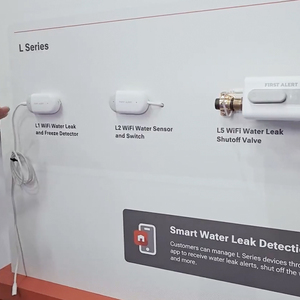I was wondering your opinions on reusing copper pipe that was frozen? The house i bought was neglected the first year of being vacant. Some of the supply lines to the radiators froze and burst. I gutted the entire house. I am wondering if it is safe to reuse some of the copper pipe. I am afraid the freezing may have weakened the pipe and don’t want a disaster down the road. Thanks guys.
Discussion Forum
Discussion Forum
Up Next
Video Shorts
Featured Story

Listeners write in about ventilation and radon control and ask questions about tightening basement garages, ventilation solutions, and safer paint stripper.
Highlights
"I have learned so much thanks to the searchable articles on the FHB website. I can confidently say that I expect to be a life-long subscriber." - M.K.
Fine Homebuilding Magazine
- Home Group
- Antique Trader
- Arts & Crafts Homes
- Bank Note Reporter
- Cabin Life
- Cuisine at Home
- Fine Gardening
- Fine Woodworking
- Green Building Advisor
- Garden Gate
- Horticulture
- Keep Craft Alive
- Log Home Living
- Military Trader/Vehicles
- Numismatic News
- Numismaster
- Old Cars Weekly
- Old House Journal
- Period Homes
- Popular Woodworking
- Script
- ShopNotes
- Sports Collectors Digest
- Threads
- Timber Home Living
- Traditional Building
- Woodsmith
- World Coin News
- Writer's Digest


















Replies
If you have any questions about it you shouldn't use it.
too much of gamble for me...
Life is not a journey to the grave with the intention of arriving safely in a pretty and well preserved body, but rather to skid in broadside, thoroughly used up, totally worn out, and loudly proclaiming
WOW!!! What a Ride!
Forget the primal scream, just ROAR!!!
Throw it away or use it to launch bottle rockets. You can't see all the weaknesses thawing water has wrought on that pipe.
Just this past spring, I experienced frozen pipes in a seasonal clubhouse. One pinhole leak was VERY difficult to locate because it was so slow and inside a wall.
You cannot really know whether that pipe is good or will be for the life of new copper.
A La Carte Government funding... the real democracy.
Use a caliper (or even a crescent wrench sized to new pipe) to determine if the frozen pipe has been expanded. If it is, you won't be able to get new fittings on it, or the fit may be so tight as to eliminate the capillary space that is needed to make melted solder flow. The capillary space should be between 2 and 9 thousandths all around for best capillary attraction.
If it's not expanded, use it with no worries at all.
Wrought copper pipe and fittings are extruded to their final shapes and sizes by a process that presses and stretches the copper to the needed shape. Such pressing and stretching in no way weakens the copper--in fact, it's tensile strength increases as it is "wrought", or worked. Freezing itself will not hurt the pipe or affect its longevity or performance in the slightest if, as I say, the pipe is not swollen to the point of not accepting fittings properly.
Copper pipe, or "tubing" as it more correctly called, is commonly bent to form 90's, 45's, etc., and the resultant thinning of the tubing wall on the outside of the bend has no appreciable effect on the performance or longevity.
"If it's not expanded, use it with no worries at all. "True with regard to stretch/deformation, but it depends whether there was mineral in the water or any sort of electrolysis corroding the pipe. I would not take a chance on anything over five years old around here
Welcome to the Taunton University of Knowledge FHB Campus at Breaktime. where ... Excellence is its own reward!
Well, seeing that here's an interesting scenario regarding an ongoing project towards restoration in a house built in '75 and the water and heat shut off to it in '99.
Sitting unused for anything but a giant trash receptacle now the question arises as to the existing copper plumbing.
Several joints throughout the system have pulled out of themselves and a local plumber says he can resolder the piping back to a functional use.
Since the piping is now approaching 35years of age, tho' 10 of that not in use, I think it's pex time or new copper but off course there is the added expense.
What's the expected life of copper piping with city water?
good Q. i've read anywhere from 20 to 60 years
Welcome to the Taunton University of Knowledge FHB Campus at Breaktime. where ... Excellence is its own reward!
Copper pipe on city water should last 75-100 years in reasonably normal conditions, with non-corrosive water. There are localities where the water is corrosive and copper begins to pinhole after 10-20 years, but they are the exception.Re the OP's situation, one could in theory make up a split gauge (two semicircles, hinged together) that would fit the pipe closely and allow you to slide the gauge down a length of pipe checking for bulges.Also, re the OP's situation, if any attempt was made to drain the pipe before it froze (even though the attempt was poorly executed), the pipes that were largely drained of water would be expected to be undamaged.Finally, if the pipe is replaced, by all means be sure to recycle the old stuff and get some $$ for it.
As I stood before the gates I realized that I never want to be as certain about anything as were the people who built this place. --Rabbi Sheila Peltz, on her visit to Auschwitz
Good ideas, all of them..
However save your copper! The currant price is too low and headed slowly up..
"I would not take a chance on anything over five years old around here"So you advocate that we re-pipe our houses every five years?BruceT
no - the question is about Re-using it - putting it back in after taking it out! Do you not see a difference in leaving sleeping dogs lie and kicking a mad dog?
Welcome to the Taunton University of Knowledge FHB Campus at Breaktime. where ... Excellence is its own reward!
Oops, I forgot the smiley sign on my post. :)SorryBruceT
oops back atcha;)
Welcome to the Taunton University of Knowledge FHB Campus at Breaktime. where ... Excellence is its own reward!
Thanks guys. The pipe is 20 years old. We don't have hard water here so that may be a plus. I will mike it one day this week and see. If i do use any it will be exposed in the basement and i will run new upstairs and in the places it will be buried.
Replace it all with PEX.
Edit: Really.
Edited 7/30/2009 8:28 pm ET by Biff_Loman
I love pex but if it aint broke, why are u fixing it.
Fix the cracked pipe, check diameter, then pressure test the system.
Boiler should only run 6-14 lbs of pressure.
Bypass the boiler and pressure up the system to 50 and make sure it holds for a while.
Water in an enclosed boiler system causes less damage than domestic water that keeps getting replenished with its acidity, minerals, etc
Bypass the boiler and pressure up the system to 50 and make sure it holds for a while.
Here we dry-charge the entire system with 120psi of compressed air, and lock it down tight for three hours with a pressure gauge in the loop. It can't leak more than 0.1psi in that time or we go looking for pinholes before flooding the system.
Dinosaur
How now, Mighty Sauron, that thou art not broughtlow by this? For thine evil pales before that whichfoolish men call Justice....
I am not a boiler guy so I wont put any pressure in a boiler. I'll let them do it.
I am comfortable pressuring the pipes though. 100 is what we usually go to for domestic but since radiator pressure is quite low, the leak is gonna be from a split in the pipe from freeze, not much of anything else from what I have seen.
Any pneumatic test is worthless IMO other then finding catastrophic leaks.
Most fuel gasses are tested at 5-15 psi , but a bubbling leak may not show on a gauge for the required 15-30 min hold period. If you ever test a gas line. Create a small bubbling leak and see for yourself how long it takes to show on the gage.
A tenth of a pound loss (or 5 lb gain) over 3 hrs would be inconclusive of anything other then a 'sorta tite' system.
Just my 2 cents.
Well, the 120psi/180min test is what provincial plumbing code specifies, at least according to the plumbing sub I use when I don't do my own work. I've sweated a fair amount of copper over the years, both new and repair, and never had a leak not show on that test.
OTOH, someone who was tempted to skimp on the time or the pressure could be in for some unpleasant surprises. I recall many (many!) moons ago the first time I realised I could use a nailgun's male connector fitting to jack my compressor into a set of new pipes before flooding them. (I was soooo proud of myself; I thought I had invented the wheel! Snork....) So I pumped in 60psi, and after 15 minutes when everything still looked good, I called it done and turned on the water.
Ooops....
Dinosaur
How now, Mighty Sauron, that thou art not broughtlow by this? For thine evil pales before that whichfoolish men call Justice....
I gutted the entire house. Plumbing, electrical everything. I am moving rooms around and changing radiator locations and type. The house had finned radiators house in sheet metal boxes, i call them school radiators. I am replacing them with cast iron beauties.
A simple way to "mike" the pipe is if you have a reasonably new and tight crescent wrench is slide it over the pipe, snug it up, and slide it down it's length.. that will quickly tell you which parts of the pipe are expanded.. (if any)
As to checking for acid etching or build up take one part of the plumbing that has opened up and look inside it.. the corners are particularly vulnerable to etching.
I've successfully reused plumbing that was 30+ years old.
wanna define successfully? Hasn't leaked in three years YET ?;)
Welcome to the Taunton University of Knowledge FHB Campus at Breaktime. where ... Excellence is its own reward!
Actually I was thinking of my first house which I lived in for 11 years.. about the third or 4th year I did some major remodeling of the bathroom and reused copperpipe that was 30+ years old.
This house I reused the pvc tubing that was only about 25 years (at that point) old or so. I started about 9 years ago and replumbed as needed since.. no leaks..
Yes there are a fair number of new fittings and even some new pipe here and there but the old was in good shape and being as cheap as I am I refuse to take some perfectly good pipe and throw it away just to buy new..
Maybe because we have good water or maybe because I know what I'm doing I felt confident enough to reuse it..
(there were a couple of pieces that had gotten brittle so I threw those away)
"there were a couple of pieces that had gotten brittle so I threw those away"How can one tell if a section of copper pipe has become brittle?What causes a particular section of pipe to become brittle and others not to? Are the pipes close to the water heater or the hot lines in general more likely to be become brittle?BruceT
I'm guessing frenchy meant that the pvc had gotten brittle, not the copper.
Copper will never get "brittle",as if it could be shattered by a blow. Soft-drawn copper tubing will become hardened, as many a plumber has learned after the roll has bounced around in the back of his truck for a year or two. What happens is that the copper becomes work-hardened by the bouncing. But the hardening would not qualify to be called brittle. It becomes as hard as fittings and hard-drawn copper are off the shelf.
Copper can be softened and re-hardened over and over with no harm to the metal. The softening is accomplished by the process you would use to harden carbon steel--you heat it bright cherry red and then quickly quench it.
Edited 8/3/2009 9:23 am ET by rdesigns
When I spoke about the copper pipes I was refering to those in my first house. Copper doesn't get brittle unless it's work hardened.. (anotherwords bent back and forth a lot)
the Brittle pipes I spoke about to Piffin were in this house. It was plumbed with HPVC so I reused those.
The brittle ones would snap if you bent them a little. Normally HPVC (& PVC) will flex rather freely. I didn't find anything common with the pieces that were brittle.. they weren't partuicularly the hot water lines or near heat sources etc.. (and less than 5% were brittle) Maybe it was the manufacturer or something else..
I have a couple ideas to test the system and be able to sleep at nights.
1st test and the standard we use it close the system and pump it up to 120psi or as close as possible. Leave it as long as possible, If it holds for a week or more without losing pressure,(remember the surrounding temp affects this too),then you should be good.
Also, you might try to find an, 'Old School' plumber. He may have a rig that will pump your lines up to over 300psi,(that's the kinda pressure thay use to test our solder joints for the Journeyman's test.
With all that said, I will agree with those who recommend the new pex piping. If you decide to redo the water lines and such, pex is the ticket! It can freeze and not be harmed or it can handle the heat as well.
Note: Heed the plumbing code! It's there for your protection!